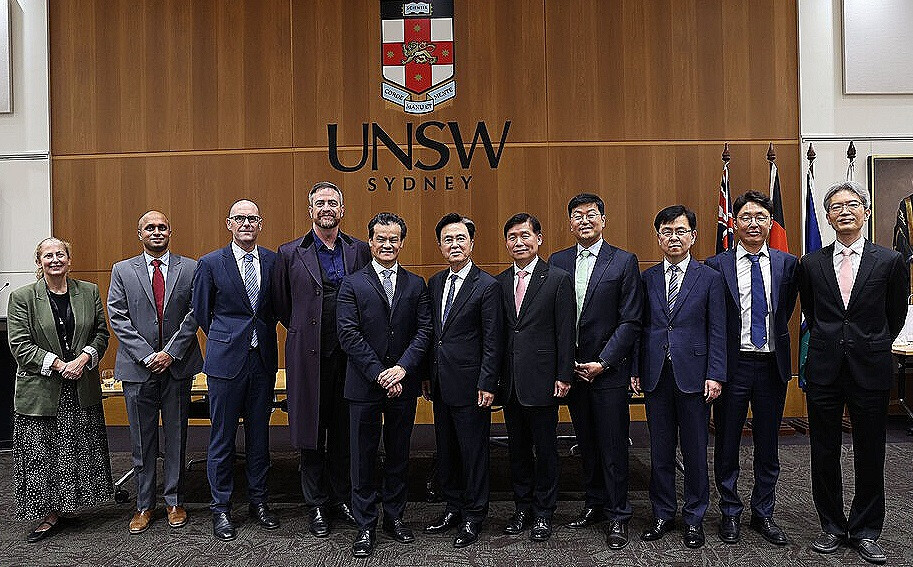
SEOUL, South Korea – The Korea Advanced Institute of Science and Technology (KAIST) and the University of New South Wales (UNSW), widely recognized as Australia's leading engineering university, have officially joined forces. This collaboration aims to foster exchange and cooperation in cutting-edge industrial fields, building on existing regional ties that could soon extend to inter-governmental discussions.
KAIST has been actively pursuing various cooperative projects with South Chungcheong Province, including the establishment and operation of a mobility research institute in Naepo New City. UNSW, for its part, is located in New South Wales (NSW), Australia. This new academic partnership is expected to serve as a catalyst for strengthening cooperation between the respective provincial governments of South Chungcheong and NSW.
South Chungcheong Governor Kim Tae-heum, currently in Australia on a mission to explore overseas markets, formalized the "Academic and Business Exchange Memorandum of Understanding" on May 30th. The signing ceremony took place at the UNSW Chancellor's Office in Sydney, with key signatories including Kim Kyung-soo, KAIST's Vice President for External Relations; Anoulack Chanthivong, NSW Minister for Industry and Trade; and Professor Attila Brungs, UNSW Vice-Chancellor and President.
The agreement outlines a comprehensive framework for collaboration between KAIST and UNSW. Both institutions are committed to enhancing academic excellence and promoting practical innovation through entrepreneurship. This will include joint efforts in:
Startup Exchange Programs and Support: Fostering entrepreneurial ecosystems by facilitating the exchange of innovative startups.
Industry-Academia Cooperation and Joint R&D: Focusing particularly on the mobility and biotechnology sectors, leveraging the strengths of both institutions.
Joint Program Operations: Promoting education and lifelong learning initiatives.
Joint Policy Forums and Initiatives: Collaborating on strategic discussions and actions to address key challenges and opportunities.
Following the signing ceremony, Governor Kim Tae-heum of South Chungcheong Province and Minister Anoulack Chanthivong of NSW held a separate meeting to discuss broader inter-regional cooperation. Governor Kim emphasized the significance of the university agreement, highlighting South Chungcheong Province's ambitious "Bay Valley Mega City" initiative. This project aims to develop the Asan Bay area into a hub akin to Silicon Valley, with a strong focus on advanced industries and technology.
Minister Chanthivong reciprocated the sentiment, stating, "Cooperation based on this memorandum of understanding will bring mutual benefits. I believe the prospects for inter-governmental cooperation are also bright. The collaboration between NSW and South Chungcheong Province is expected to pave a good path for prosperity." This indicates a shared vision to expand the scope of collaboration beyond academia, encompassing economic development and trade.
South Chungcheong Province anticipates that this agreement will significantly contribute to various initiatives, including startup exchange programs, international joint research, and carbon neutrality cooperation between the province and Australia. Governor Kim emphasized South Chungcheong's robust economic standing at the signing ceremony, noting its top rankings in South Korea for various economic indicators such as Gross Regional Domestic Product (GRDP) and exports. He highlighted the province's solid industrial foundation in display, semiconductors, petrochemicals, and mobility, which are actively fostering scientific technology and related industries.
Governor Kim also reiterated South Chungcheong's commitment to carbon neutrality, stating, "South Chungcheong has declared itself a 'Carbon Neutral Economy Special Province,' approaching carbon neutrality from an economic growth perspective." He expressed hope that the KAIST-UNSW collaboration would serve as a stepping stone for expanded cooperation in diverse fields at the local government level between the two countries.
Minister Chanthivong, referencing his recent visit to South Korea, stressed the importance of reliable partners in an uncertain world. "In a world full of uncertainties, trustworthy partners are more valuable than ever," he remarked. "I believe close cooperation with technologically and educationally advanced Korea is crucial, and I look forward to mutual respect and development between Australia and Korea."
UNSW: A Global Leader in Engineering and Research
Established in 1949, UNSW is a public research-intensive university renowned for its engineering prowess. It boasts a substantial student body, comprising 35,679 undergraduate students and 18,226 postgraduate students. Ranked 18th globally among universities, UNSW holds the top position in engineering among the "Group of Eight" — Australia's equivalent to the Ivy League. Its strong focus on research, innovation, and practical application aligns well with KAIST's mission, making it a natural partner for this strategic alliance.
New South Wales: Australia's Economic Powerhouse
New South Wales, located in southeastern Australia, is a vast state spanning 809,444 square kilometers with a population of over 8.16 million. Its capital, Sydney, is a global financial and cultural hub, contributing significantly to Australia's economy. The state's diverse economy, strong research institutions, and a government keen on international collaboration make it an attractive partner for South Chungcheong Province.
Potential for Broader Bilateral Impact
This university-level partnership, supported by provincial governments, could foster a deeper relationship between South Korea and Australia. Beyond academic exchange, it could lead to joint ventures in advanced manufacturing, renewable energy technologies, and digital innovation. As both nations prioritize technological self-sufficiency and sustainable growth, collaborations like this lay the groundwork for shared progress and resilience in the global economy. The emphasis on startups and joint research also signals a commitment to cultivating future-ready industries and talent, directly contributing to the economic competitiveness of both South Chungcheong and NSW.
[Copyright (c) Global Economic Times. All Rights Reserved.]






























